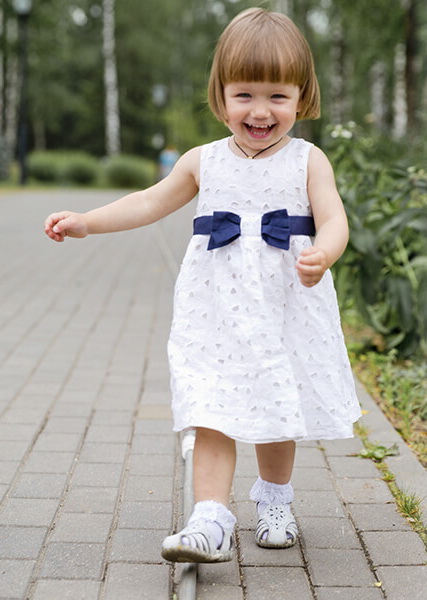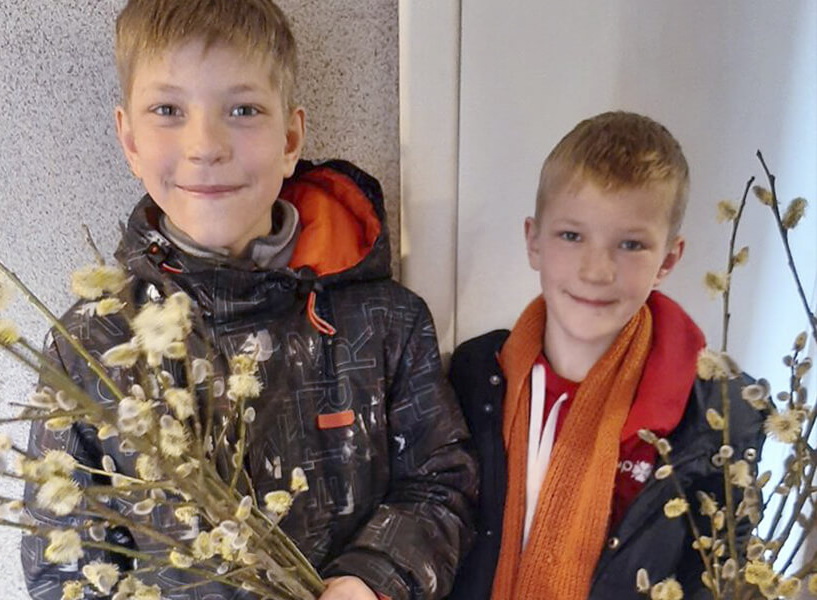
Matuska Larisa, Father Sergius, Matvey, Katya and Artyom
It took us several weeks to finalise the guardianship documents and to prepare our house for the coming of our little girl. Some of our friends and relatives donated us a crib and some baby clothes. I assigned a shelf in the wardrobe for our baby girl's clothing, and I was enamoured at seeing them all there.
I went to pick up the girl all by myself. I bought a few cakes for the staff to celebrate a happy moment. But my knees were still shaking all the way, and I was having butterflies in the stomach. It was so hard for me to imagine myself bringing home this little baby girl whom I had never known before, and turning a new page in the book of my life. I had finalised all the paperwork but still could not force myself to step through that door. I found a quiet place in the institution's lobby and wrote on Viber to all the other people at the workshop and to my neighbours that I was picking up the little girl from the orphanage - to pre-empt any questions about her origin later on. Everyone welcomed the news, and greetings began to flow in. I felt relieved. The staff brought me the girl dressed in the clothing that we had acquired for her, and we went home.
I which I had taken the contacts of the people who had been caring for her and looking after her before me. I had never had to care for a baby girl before, so I had a lot of difficulty at first getting her to eat and drink, and the advice that I was getting from the other new mothers was not helpful at all. It took us about six months to set up our feeding and toilet routines. One big relief was that the girl would go to sleep quickly and slept very well. This freed me up for doing things with the other children.

Katya
When I was holding her at first, she just lay motionless without much response. It was not until several months later that she learned to put her arms and legs around me and hold on to my body like a little monkey. Apparently, she had not been used to being held. She was not interested in toys and could do nothing to keep herself busy even for a second. All she could do was roll on her back and such on her finger; this must have been her main occupation at the orphanage, I assume. She was one year and one month of age, and she still could not walk. She was not very healthy either; according to her medical records, she had had seven episodes of bronchitis and one of pneumonia in one year, despite being born on the term and with a good Apgar score. What a sad result of being taken away from her 'problem' mother to a 'problem-free' infant orphanage! Many professionals and even close relatives of infants separated from their mother still do not recognise the extent to which this experience can traumatise a child.
We went to an excellent massage therapist, and we made visible progress after each session with him in terms of motor development. She was diagnosed at the polyclinic with slow speech development, and I insisted on her early treatment at the early intervention centre of the polyclinic. We got a referral to a speech therapist, which was essential for the girl. I already knew from my experience with the other children that early treatment increases the chances of good outcomes. It is best not to wait for the problem to go away by itself. We gave her vitamins and dietary supplements for the nervous system, we worked in strengthening her immunity and alleviating her allergy. Eventually, the girl's condition began to improve.
I was often asked, especially in the beginning if the older children had any jealousy towards the baby girl. There were no direct shows of jealousy that I can remember. Nobody ever suggested, for example, that we should 'give her back'. However, the amount of my time available for everybody else certainly became more limited. I had to give up on some routines, and putting everyone to bed became more difficult. Naturally, this pushed the other children to become more independent. For example, we let them travel to out of school activities earlier than the parents of their peers. They also became more competitive towards one another. Perhaps this increased competitiveness for our attention could be viewed as a sign of jealousy. On the other hand, each boy in isolation has become calmer and more even-tempered. When the times are good, they can help me look after the baby - like cleaning her toilet pot, or playing with her when I am late from work. On their bad days, things are difficult for everyone - themselves and all the people around them.
I am also asked if girls are any easier than boys. I am not sure there is a basis for comparison. Two boys adopted at ages 2 and 3 and a one-year-old girl are in very different situations. She was our third child, and I can say with confidence that having two children is much easier than having three if the age difference is small and there are no adult helpers available. In general, however, the typical girl is more likely than the typical boy to be nicer, more obedient, softer, more affectionate and more vulnerable. I first experienced this difference when I saw my little girl trying to climb up the window sill and turn the handle of the window. I spoke to her quite sternly, telling her not to do it because it was dangerous. She listened to me silently but burst out crying bitterly when I finished. Eventually, we just child-proofed our windows by putting locks on them. I was shocked. My boys mostly do not take my criticisms very lightly. Indeed, tears are a woman's most potent weapon.

Father Sergius, Matuska Larisa with their children
Initially, my little one had a lot of fear from my husband. It was understandable, as the people who work at infant orphanages are mostly women, and the children there will almost never see any men. But my husband was disheartened and upset. When wanted a break and gave him the baby to hold for a few moments, she would have a fit. "Why are you setting her up against me," he would ask, with disappointment. However, after only a few months she felt a lot more comfortable. Now, they are the best of friends.
One acquaintance of mine asked me if I was feeling any guilt towards the girl's biological mother. She asked this after I told her that her mother had not given her up - the baby girl was taken away from her against her will. The child protection officers will certainly justify their actions by referring to the best interests of the child. But the notion of best interests is rarely straightforward. Of course, some situations are just not appropriate for children, but an orphanage can be no less traumatising for a child than a problem family. My acquaintance found my weak spot. I told her then that I had no apparent reason to feel guilty, as I met the girl long after she was taken away, and played no part in it. Her relatives had more than a year to file for guardianship and take her from the orphanage. They made the attempt, but could not follow through on it. Nevertheless, deep in my heart, I was still feeling guilty. I feel guilty because she is so sweet, and I am so happy to be with her despite all the difficulties that arise from time to time, and because I know that her mother almost killed herself when they took her away from her in the maternity ward. - She is a child of two families, and I am still trying to figure out how to come to terms with this situation, and to decide what my role should be in her life.
My guilty feelings were partly the product of my curiosity - how close to the truth were the descriptions of her family members that I head from the staff of the orphanage; I also wanted to know better by child's background. These were my main motives to locate the relatives of the little girl and meet them. I did the same when we adopted the boys - I looked up their relatives and tried to get in touch with them. I met none of the relatives of the boys - just exchanged letters and calls with their mother and grandmother.

Artyom and Matvey
But I did meet the extended family of the girl. As it turned out, the description I heard from the orphanage's staff was not fully accurate. Some of her relatives live in remote areas and have drinking problems. But her extended family is quite large, and there are different people in it, some quite successful and well-to-do. It just happened that they had not taken seriously at fist the threat of having the baby removed from the family. When this actually happened, they could not push hard enough to have her returned, but they tried hard. "They kept pestering us all the time," said the child protection services. It is a very sad story from all perspectives.
One meeting I was most apprehensive about was with the girl's mother. The girls' other relatives (grandmother and aunts) were friendly and quite supportive. They said they were relieved to know that the girl is in the care of a good family where she will be well looked after. As for her mother... I was apprehensive, but I met her eventually. On the one hand, I was somewhat relieved - it removed many of the uncertainties. On the other, I do not know how the relationships will evolve in future. When our girl turns eighteen, she will not be legally entitled to live with us, and all of her rights and duties will apply to her biological family. I hope that things will work out in a way that is best for the girl.
Why did I meet the family? First, to remove the uncertainty in my mind, to fill all the gaps in my knowledge of the girl's background; I also needed to know about any of the congenital diseases that run in her family. I also thought it was cruel towards the mother to have taken her child away from her and not letting her know her whereabouts and how she is. I know that people's situations may be different. I thought that this was the most appropriate thing to do in mine.
The story of any adopted child is a very sad one in this regard. But let us not lose the hope that adoptions are made in heaven, and there is meaning to any adoption for all the parties involved. As far as I was concerned, the selection criteria that had no bearing on the choice; I opened up my heart and welcomed a new child from our family as a gift from above.
By Larisa Nezhbort